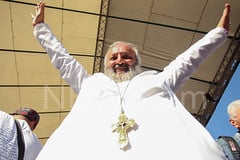Extraordinary presidential elections in Azerbaijan took place in an atmosphere of restriction of the basic rights and freedoms that are necessary for a truly democratic election campaign, stated international observers from the OSCE, the OSCE PA and PACE at a press conference in Baku on April 12. The international mission included short-term OSCE observers, a long-term mission of the OSCE/ODIHR, delegations of the Council of Europe Parliamentary Assemblies and the OSCE, contact.az reported.
Against the backdrop of restricting rights and in the absence of pluralism, including the media, there was no genuine competition in the elections. The candidates refrained from direct contestation or criticism of the incumbent president. At the same time, there was no difference between the election campaign and the activities of the president, according to a statement by international observers.
On election day, observers noted massive ignoring of mandatory procedures, lack of transparency and numerous serious violations, including massive ballot stuffing into ballot boxes.
More than half of the vote counts by observers were assessed "negatively, due to deliberate falsifications and obvious disregard for the procedures."
Reading the text of the statement, Nils de Sena, head of the OSCE short-term observation mission, called on the authorities to "carefully review the recommendations that the ODIHR will make in its final report."
The elections took place under the dominance of the ruling New Azerbaijan Party (NAP). The opposition boycotted the elections due to a non-competitive environment and lack of time.
The campaign of the ruling party was provided with resources, and the candidate himself made visits throughout the country and hosted high-ranking guests. But the campaigns of the remaining seven candidates were limited, and they did not have regional structures and resources, she noted.
"In a political environment where democratic principles are compromised and the rule of law is not respected, fair and free elections are impossible," said Viorel Riceard Badea, head of the PACE delegation. "On election day, we observed violations, but it is difficult to say how this affected the outcome of the elections," he added.
Restrictive laws restrict freedom of expression and the press, including websites and social networks. Defamation is a criminal offense punishable by imprisonment and additional sanctions for insulting the president. "A few weeks of campaigning during which candidates could present their views on TV cannot compensate for years, during which restrictions on freedom of expression were drowned out by political debates," said Margareta Kiener Nellen, head of the OSCE PA delegation.
"The fundamental rights and freedoms that are prerequisites for genuinely democratic elections are in practice severely limited," said Corien Jonker, head of the long-term OSCE/ODIHR mission. "The authorities must fulfill the obligations of Azerbaijan as a member state of the OSCE to respect, protect and support the democratic rights of its citizens," she said.
This was the first presidential election since the constitutional amendments in 2016 further increased the authority of the president. A number of constitutionally guaranteed fundamental rights and freedoms related to elections are subject to restrictions in practice. None of the priority recommendations of the ODIHR and the Venice Commission was accepted by the authorities, the mission statement concluded.
The statement of the mission members was interrupted by the cries and aggressive actions of the supporters of the authorities in the person of members of the Press Council and NGOs working with the authorities.
So, the editor of the newspaper "Iki Sahil" Vugar Rahimzade called the conclusion of the mission - "an insult to the Azerbaijani people, written on the order of anti-Azerbaijani forces and far from reality."
He gave a lecture for a long time about the achievements of Azerbaijan and the hostile activities of certain circles served by international observers.
He was echoed by the editor of the newspaper "Syas" Bahruz Guliyev, who demanded to provide evidence of the violations mentioned in the report. "You brought with you a ready report written by the enemies of Azerbaijan," he said in conclusion.
After listening to the emotional statements of the supporters of the authorities, the mission members noted that all the facts and conclusions will be presented in the final report of the mission. In the meantime, we can say that 12% of the polling stations recorded very serious violations. On a number of sites, international observers were subjected to pressure and could not work.
In Azerbaijan, they block websites, put journalists who expose corruption of the authorities, the media work only on the authorities - all these are indicators of bias. According to the CEC, you have one number of voters, and according to State Statistical Committee, another. The authorities create the privileges of their party and actively use students for propaganda purposes. All this says and does not correspond to international standards and commitments that Azerbaijan voluntarily accepted and invited us to evaluate the elections according to these standards, Nils De Sena said in conclusion.






















